Piano Sheet Music
 "If being an egomaniac means I believe in what I do and in my art or music, then in that respect you can call me that... I believe in what I do, and I'll say it." John Lennon
"If being an egomaniac means I believe in what I do and in my art or music, then in that respect you can call me that... I believe in what I do, and I'll say it." John Lennon
Finding Neverland
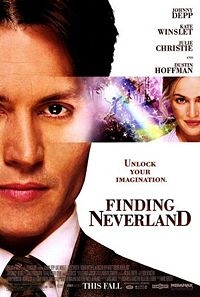
Finding Neverland is a 2004 British/American semi-biographical film directed by Marc Forster. The screenplay by David Magee is based on the play The Man Who Was Peter Pan by Allan Knee.
Grease

Grease is a film directed by Randal Kleiser and based on Jim Jacobs' and Warren Casey's musical, Grease. The film stars John Travolta, Olivia Newton-John, Stockard Channing, Jeff Conaway, and Eve Arden. It was originally released to theatres on June 16, 1978. It was filmed at Venice High School in Venice, California. It was released in the U.S. on VHS during the 1980s; the latest VHS release was June 23, 1998 as 20th Anniversary Edition following a theatrical re-release that March. On September 24, 2002, it was released on DVD for the first time. On September 19, 2006, it was re-released on DVD as the Rockin' Rydell Edition, which includes a black Rydell High T-Bird jacket cover or the Target-exclusive Pink Ladies cover.
Pirates of the Caribbean: Dead Mans Chest
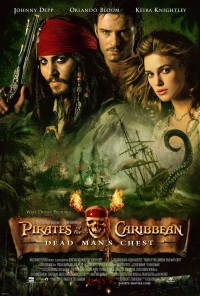
Pirates of the Caribbean: Dead Man's Chest is a 2006 adventure film of the Pirates of the Caribbean series, the sequel to the 2003 film Pirates of the Caribbean: The Curse of the Black Pearl and the first film from Walt Disney Pictures to feature the current logo. The film was directed by Gore Verbinski, written by Ted Elliott and Terry Rossio, and produced by Jerry Bruckheimer. The movie received 4 Academy Award nominations for Best Art Direction, Sound Editing, Sound Mixing, and won the Academy Award for Visual Effects.
The story picks up from where the first film left off when Captain Jack Sparrow (Johnny Depp) discovers his debt to the villainous Davy Jones (Bill Nighy) is due, while Will Turner (Orlando Bloom) and Elizabeth Swann (Keira Knightley) are arrested by Lord Cutler Beckett (Tom Hollander) for helping Jack Sparrow escape execution.
The film was shot back-to-back with the third film during 2005, and was released in Australia and the United Kingdom on July 6, 2006, and in the United States and Canada on July 7, 2006. The film received mixed reviews, with praise for its special effects and criticism for its confusing plot and lengthy running time. Despite this, Pirates of the Caribbean: Dead Man's Chest set several records in its first three days, with an opening weekend of $136 million in the United States, and became the third movie to gross over $1 billion in the worldwide box office, behind Titanic and The Lord of the Rings: The Return of the King.
The story picks up from where the first film left off when Captain Jack Sparrow (Johnny Depp) discovers his debt to the villainous Davy Jones (Bill Nighy) is due, while Will Turner (Orlando Bloom) and Elizabeth Swann (Keira Knightley) are arrested by Lord Cutler Beckett (Tom Hollander) for helping Jack Sparrow escape execution.
The film was shot back-to-back with the third film during 2005, and was released in Australia and the United Kingdom on July 6, 2006, and in the United States and Canada on July 7, 2006. The film received mixed reviews, with praise for its special effects and criticism for its confusing plot and lengthy running time. Despite this, Pirates of the Caribbean: Dead Man's Chest set several records in its first three days, with an opening weekend of $136 million in the United States, and became the third movie to gross over $1 billion in the worldwide box office, behind Titanic and The Lord of the Rings: The Return of the King.
Brokeback Mountain
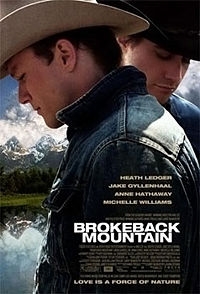
Brokeback Mountain is a 2005 romantic-drama film that depicts the complex romantic and sexual relationship between two men in the American West from 1963 to 1983.
The film was directed by Taiwanese director Ang Lee from a screenplay by Diana Ossana and Larry McMurtry, which they adapted from the short story "Brokeback Mountain" by Annie Proulx. The film stars Heath Ledger, Jake Gyllenhaal, Anne Hathaway, and Michelle Williams.
Brokeback Mountain won the Golden Lion at the Venice Film Festival, and was honored with Best Picture and Best Director accolades from the British Academy of Film and Television Arts, Golden Globe Awards, Critics Choice Awards, and Independent Spirit Awards among many other organizations and festivals. Brokeback Mountain had the most nominations (eight) for the 78th Academy Awards, where it won three: Best Director, Best Adapted Screenplay, and Best Original Score. The film was widely considered to be a front runner for the Academy Award for Best Picture, but lost to Crash.
The film was directed by Taiwanese director Ang Lee from a screenplay by Diana Ossana and Larry McMurtry, which they adapted from the short story "Brokeback Mountain" by Annie Proulx. The film stars Heath Ledger, Jake Gyllenhaal, Anne Hathaway, and Michelle Williams.
Brokeback Mountain won the Golden Lion at the Venice Film Festival, and was honored with Best Picture and Best Director accolades from the British Academy of Film and Television Arts, Golden Globe Awards, Critics Choice Awards, and Independent Spirit Awards among many other organizations and festivals. Brokeback Mountain had the most nominations (eight) for the 78th Academy Awards, where it won three: Best Director, Best Adapted Screenplay, and Best Original Score. The film was widely considered to be a front runner for the Academy Award for Best Picture, but lost to Crash.
A Beautiful Mind
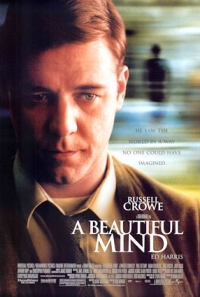
A Beautiful Mind is a 2001 American biographical film about John Forbes Nash, the Nobel Laureate in Economics. The film was directed by Ron Howard and written by Akiva Goldsman. It was inspired by a bestselling, Pulitzer Prize-nominated 1998 book of the same name by Sylvia Nasar. The film stars Russell Crowe, along with Jennifer Connelly, Ed Harris and Paul Bettany.
The story begins in the early years of Nash's life at Princeton University as he develops his "original idea" that will revolutionize the world of mathematics. Early in the movie, Nash begins developing paranoid schizophrenia and endures delusional episodes while painfully watching the loss and burden his condition brings on his wife and friends.
The film opened in US cinemas on December 21, 2001. It was well-received by critics, grossed over $300 million worldwide, and went on to win four Academy Awards, including Best Picture, Best Director, Best Adapted Screenplay, and Best Supporting Actress. It was also nominated for Best Leading Actor, Best Editing, Best Makeup, and Best Score. The film has been criticized for its inaccurate portrayal of some aspects of Nash's life.
The story begins in the early years of Nash's life at Princeton University as he develops his "original idea" that will revolutionize the world of mathematics. Early in the movie, Nash begins developing paranoid schizophrenia and endures delusional episodes while painfully watching the loss and burden his condition brings on his wife and friends.
The film opened in US cinemas on December 21, 2001. It was well-received by critics, grossed over $300 million worldwide, and went on to win four Academy Awards, including Best Picture, Best Director, Best Adapted Screenplay, and Best Supporting Actress. It was also nominated for Best Leading Actor, Best Editing, Best Makeup, and Best Score. The film has been criticized for its inaccurate portrayal of some aspects of Nash's life.
Tarzan

Tarzan is a 1999 animated feature film produced by Walt Disney Feature Animation and released by Walt Disney Pictures on June 18, 1999. The thirty-seventh film in the Disney animated features canon, it is based on the story Tarzan of the Apes by Edgar Rice Burroughs, and is the only major motion picture version of the story Tarzan property to be animated. It was also the last "bona fide" hit before the Disney slump of the early 2000s making $171,091,819 in domestic gross and $448,191,819 worldwide, outgrossing its predecessors Mulan and Hercules. To date, it is the last film based on the fictional character Tarzan to have had a theatrical release, and also currently holds the record for being the most expensive Disney animated film, with a budget of $150 million. It was also the first Disney animated feature to open at #1 since Pocahontas. It is the last movie that belongs to the Disney Renaissance.
Tarzan: An Original Walt Disney Records Soundtrack is the soundtrack for the 1999 Disney animated film, Tarzan. The songs on the soundtrack were by Phil Collins, and the instrumental score by Mark Mancina. The song "You'll Be in My Heart," won both an Oscar and a Golden Globe for best original song.
Tarzan was the first Disney soundtrack to be recorded in multiple languages for different markets, some by original singer Collins. Phil Collins was helped by composer Eric Serra to record and produce French version of the songs.
Tarzan: An Original Walt Disney Records Soundtrack is the soundtrack for the 1999 Disney animated film, Tarzan. The songs on the soundtrack were by Phil Collins, and the instrumental score by Mark Mancina. The song "You'll Be in My Heart," won both an Oscar and a Golden Globe for best original song.
Tarzan was the first Disney soundtrack to be recorded in multiple languages for different markets, some by original singer Collins. Phil Collins was helped by composer Eric Serra to record and produce French version of the songs.
Friends
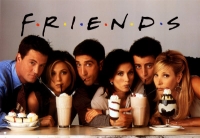
Friends is a sitcom about a group of friends in the Greenwich Village area of Manhattan, New York City. It was originally broadcast from 1994 to 2004. It was created by David Crane and Marta Kauffman, and produced by Kevin S. Bright, Marta Kauffman and David Crane. The show has been broadcast in more than one hundred countries and still continues to attract good ratings for its episodes in syndication. The final episode of the show was watched by an estimated US audience of 51.1 million. From the 10 years run, the show had won 6 Emmys, including one for Outstanding Comedy Series. It also received a Golden Globe, 2 SAG Awards, and 56 other various awards with 152 nominations.
The Simpsons

The Simpsons is an American animated sitcom which was created by Matt Groening for the Fox Broadcasting Company. It is a satirical parody of the middle class American lifestyle epitomized by its titular family, which consists of Homer, Marge, Bart, Lisa, and Maggie. The show is set in the fictional town of Springfield, and it lampoons many aspects of the human condition, as well as American culture, society as a whole, and television itself.
The family was conceived by Groening shortly before a pitch for a series of animated shorts with the producer James L. Brooks. Groening created a dysfunctional family and named the characters after members of his own family, substituting Bart for his own name. The shorts became a part of The Tracey Ullman Show on April 19, 1987. After a three-season run, the sketch was developed into a half-hour prime time show and was an early hit for Fox, becoming the first Fox series to land in the Top 30 ratings in a season (1992-1993).
Since its debut on December 17, 1989, the show has broadcast 420 episodes and the twentieth season will commence airing in on September 28, 2008. The Simpsons Movie, a feature-length film, was released in theaters worldwide on July 26 and July 27, 2007, and has grossed approximately US$526.2 million worldwide to date.
The Simpsons has won dozens of awards since it debuted as a series, including 24 Emmy Awards, 26 Annie Awards and a Peabody Award. Time magazine's December 31, 1999 issue named it the 20th century's best television series, and on January 14, 2000 it was awarded a star on the Hollywood Walk of Fame. The Simpsons is the longest-running American sitcom and the longest-running American animated program. Homer's annoyed grunt "D'oh!" has been adopted into the English lexicon, while The Simpsons has influenced many adult-oriented animated sitcoms.
The series' distinctive theme song was composed by musician Danny Elfman in 1989, after Groening approached him requesting a retro style piece. This piece, which took two days to create, has been noted by Elfman as the most popular of his career.
The family was conceived by Groening shortly before a pitch for a series of animated shorts with the producer James L. Brooks. Groening created a dysfunctional family and named the characters after members of his own family, substituting Bart for his own name. The shorts became a part of The Tracey Ullman Show on April 19, 1987. After a three-season run, the sketch was developed into a half-hour prime time show and was an early hit for Fox, becoming the first Fox series to land in the Top 30 ratings in a season (1992-1993).
Since its debut on December 17, 1989, the show has broadcast 420 episodes and the twentieth season will commence airing in on September 28, 2008. The Simpsons Movie, a feature-length film, was released in theaters worldwide on July 26 and July 27, 2007, and has grossed approximately US$526.2 million worldwide to date.
The Simpsons has won dozens of awards since it debuted as a series, including 24 Emmy Awards, 26 Annie Awards and a Peabody Award. Time magazine's December 31, 1999 issue named it the 20th century's best television series, and on January 14, 2000 it was awarded a star on the Hollywood Walk of Fame. The Simpsons is the longest-running American sitcom and the longest-running American animated program. Homer's annoyed grunt "D'oh!" has been adopted into the English lexicon, while The Simpsons has influenced many adult-oriented animated sitcoms.
The series' distinctive theme song was composed by musician Danny Elfman in 1989, after Groening approached him requesting a retro style piece. This piece, which took two days to create, has been noted by Elfman as the most popular of his career.
Charlie Brown

Charles "Charlie" Brown is the main character in the comic strip Peanuts by Charles M. Schulz.
The Wedding Singer (Musical)

The Wedding Singer is a musical based on the film The Wedding Singer, with music by Matthew Sklar, lyrics by Chad Beguelin, and a book by Chad Beguelin and Tim Herlihy.
The musical opened on Broadway at the Al Hirschfeld Theatre on April 27, 2006 and closed on December 31, 2006 after 284 performances. It was directed by John Rando, with choreography by Rob Ashford, and featured Stephen Lynch as Robbie.
A U.S. tour began on August 31, 2007. A Swedish version opened in Karlstad on September 1, 2007. El Rey de Bodas, the Spanish-language version, which translates into "The King of Weddings", opened in Madrid in October 2007.
A UK tour opened at the Manchester Palace Theatre in February 2008 starring Jonathan Wilkes and Natalie Casey, and after touring the UK is then expected to begin an open-ended West End run towards the end of 2008 and early 2009. The Japanese version will open in Tokyo at the Nissay Theatre on February 6, 2008, and other foreign productions are scheduled for Finland, Germany, Australia, and South Korea. The show's New Zealand premiere season started on April 3rd and ran until April 13, 2008 at Palmerston North Boys' High School's Speirs Centre with a cast of amateur actors from Palmerston North Boys' and Palmerston North Girls' High Schools. The season was directed by Chris Burton and Liz O'Connor. South Australian premiere will open on July 9th 2008 at the Arts Theatre, Adelaide, presented by Matt Byrne Media.
Amateur rights have been released in Australia prior to any professional production.
In Finland, an open air version of the musical will be performed in the city of Turku from June to August 2008.
The musical opened on Broadway at the Al Hirschfeld Theatre on April 27, 2006 and closed on December 31, 2006 after 284 performances. It was directed by John Rando, with choreography by Rob Ashford, and featured Stephen Lynch as Robbie.
A U.S. tour began on August 31, 2007. A Swedish version opened in Karlstad on September 1, 2007. El Rey de Bodas, the Spanish-language version, which translates into "The King of Weddings", opened in Madrid in October 2007.
A UK tour opened at the Manchester Palace Theatre in February 2008 starring Jonathan Wilkes and Natalie Casey, and after touring the UK is then expected to begin an open-ended West End run towards the end of 2008 and early 2009. The Japanese version will open in Tokyo at the Nissay Theatre on February 6, 2008, and other foreign productions are scheduled for Finland, Germany, Australia, and South Korea. The show's New Zealand premiere season started on April 3rd and ran until April 13, 2008 at Palmerston North Boys' High School's Speirs Centre with a cast of amateur actors from Palmerston North Boys' and Palmerston North Girls' High Schools. The season was directed by Chris Burton and Liz O'Connor. South Australian premiere will open on July 9th 2008 at the Arts Theatre, Adelaide, presented by Matt Byrne Media.
Amateur rights have been released in Australia prior to any professional production.
In Finland, an open air version of the musical will be performed in the city of Turku from June to August 2008.
Pinocchio

Pinocchio is the second animated feature in the Walt Disney Animated Classics. It was produced by Walt Disney and was originally released to theatres by RKO Radio Pictures on February 7, 1940. Based on the story Pinocchio: Tale of a Puppet by Carlo Collodi, it was made in response to the enormous success of Snow White and the Seven Dwarfs. The plot of the film involves a wooden puppet being brought to life by a blue fairy, who tells him he can become a real boy if he proves himself "brave, truthful, and unselfish". Thus begin the puppet's adventures to become a real boy, which involve many encounters with a host of unsavory characters.
The film was adapted by Aurelius Battaglia, William Cottrell, Otto Englander, Erdman Penner, Joseph Sabo, Ted Sears, and Webb Smith from Collodi's book. The production was supervised by Ben Sharpsteen and Hamilton Luske, and the film's sequences were directed by Norman Ferguson, T. Hee, Wilfred Jackson, Jack Kinney, and Bill Roberts.
Pinocchio is the soundtrack to the 1940 Walt Disney film of the same name, first released on February 9, 1940. The album was described as being "recorded from the original soundtrack of the Walt Disney Production Pinocchio". According to Walt Disney Records, "this is the first time the phrase 'original soundtrack' was used to refer to a commercially available movie recording".
The film was adapted by Aurelius Battaglia, William Cottrell, Otto Englander, Erdman Penner, Joseph Sabo, Ted Sears, and Webb Smith from Collodi's book. The production was supervised by Ben Sharpsteen and Hamilton Luske, and the film's sequences were directed by Norman Ferguson, T. Hee, Wilfred Jackson, Jack Kinney, and Bill Roberts.
Pinocchio is the soundtrack to the 1940 Walt Disney film of the same name, first released on February 9, 1940. The album was described as being "recorded from the original soundtrack of the Walt Disney Production Pinocchio". According to Walt Disney Records, "this is the first time the phrase 'original soundtrack' was used to refer to a commercially available movie recording".
Gladiator
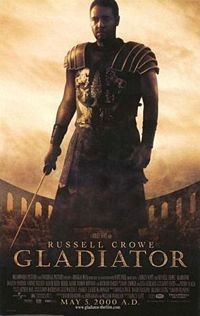
Gladiator is a 2000 epic film directed by Ridley Scott and starring Russell Crowe, Joaquin Phoenix, Connie Nielsen, Oliver Reed, Djimon Hounsou, Derek Jacobi and Richard Harris. Crowe portrays General Maximus Decimus Meridius, friend of Emperor Marcus Aurelius who is betrayed and murdered by the emperor's ambitious son, Commodus (Phoenix). Captured and enslaved along the outer fringes of the Roman empire, Maximus rises through the ranks of the gladiatorial arena to avenge the murder of his family and his Emperor.
The film won five Academy Awards in the 73rd Academy Awards ceremony, including Best Picture. The film's epic scope and intense battle scenes, as well as the emotional core of its performances, received much praise. The film's success may have helped to revive the sword and sandal subgenre of historical epics, such as the subsequent films Troy, 300, and Scott's own Kingdom of Heaven.
The film won five Academy Awards in the 73rd Academy Awards ceremony, including Best Picture. The film's epic scope and intense battle scenes, as well as the emotional core of its performances, received much praise. The film's success may have helped to revive the sword and sandal subgenre of historical epics, such as the subsequent films Troy, 300, and Scott's own Kingdom of Heaven.
Music and Lyrics

Music and Lyrics is a romantic comedy film released by Warner Bros. on February 14, 2007 in the United States, Canada, and Australia, and on February 9, 2007 in the United Kingdom. The film stars Hugh Grant as Alex Fletcher, a washed-up 1980s pop star and Drew Barrymore as Sophie Fisher, a former English literature major. It tells the story of their efforts to write a song for singer Cora Corman (Haley Bennett), and their subsequent romance.
The film received mixed reviews from contemporary critics, but topped the UK box office. At the North American box office, it debuted at number four and generated $19 million in its first week.
The film received mixed reviews from contemporary critics, but topped the UK box office. At the North American box office, it debuted at number four and generated $19 million in its first week.
Pearl Harbor
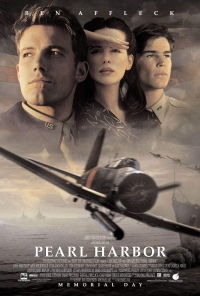
Pearl Harbor is a 2001 war film directed by Michael Bay. It features a large ensemble cast, including Ben Affleck, Alec Baldwin, Jon Voight, Josh Hartnett, Kate Beckinsale, Cuba Gooding Jr., Dan Aykroyd, Jaime King, and Jennifer Garner. It is a dramatic re-imagining of the attack on Pearl Harbor, produced by the team of Bay and Jerry Bruckheimer, who had previously worked on summer mega-blockbusters such as Armageddon and The Rock. The final section of the movie recounts the Doolittle Raid, the first American attack on the Japanese home islands in World War II. Some scenes in the movie were some of the last to be filmed in Technicolor.
Requiem for a Dream

Requiem for a Dream is an Academy Award-nominated 2000 film adaptation of the 1978 novel of the same name. The novel was written by Hubert Selby, Jr.; the film adaptation was directed by Darren Aronofsky, and starred Ellen Burstyn, Jared Leto, Jennifer Connelly, Matt Taylor and Marlon Wayans. Burstyn was nominated for an Academy Award for Best Actress for her performance.
City of Angels
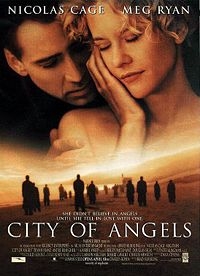
City of Angels is an English language film directed by Brad Silberling in 1998. The film stars Nicolas Cage and Meg Ryan. Set in Los Angeles, California, the film is a remake of Wim Wenders' 1987 German film Wings of Desire (Der Himmel über Berlin), which was set in Berlin.
Cinema Paradiso

Nuovo Cinema Paradiso (1988) is an Italian film written and directed by Giuseppe Tornatore. It was internationally released as Cinema Paradiso in France, Spain, the UK and the U.S.
It was originally released in Italy at 155 minutes but poor box office performance in its native country led to it being shortened to 123 minutes for international release. It was an instant success. This international version won the Special Jury Prize at the 1989 Cannes Film Festival and the 1989 Best Foreign Language Film Oscar. In 2002, the director's cut 173-minute version was released (known in the U.S. as Cinema Paradiso: The New Version).
It stars Jacques Perrin, Philippe Noiret, Leopoldo Trieste, Marco Leonardi, Agnese Nano and Salvatore Cascio. It was produced by Franco Cristaldi and Giovanna Romagnoli, and the music was by Ennio Morricone along with his son Andrea Morricone.
Told in flashback, it tells the story of the return to his native Sicilian village of a successful film director Salvatore for the funeral of his old friend Alfredo, who was the projectionist at the local "Cinema Paradiso". Ultimately, Alfredo serves as a wise father figure to his young friend who only wishes the best to see him succeed, even if it means breaking his heart in the process.
The film intertwines sentimentality with comedy, and nostalgia with pragmaticism. It explores issues of youth, coming of age, and reflections (in adulthood) about the past. The imagery in each scene can be said to reflect Salvatore's idealised memories about his childhood. Cinema Paradiso is also a celebration of films; as a projectionist, young Salvatore (a.k.a Totò) develops the passion for films that shape his life path in adulthood.
It was originally released in Italy at 155 minutes but poor box office performance in its native country led to it being shortened to 123 minutes for international release. It was an instant success. This international version won the Special Jury Prize at the 1989 Cannes Film Festival and the 1989 Best Foreign Language Film Oscar. In 2002, the director's cut 173-minute version was released (known in the U.S. as Cinema Paradiso: The New Version).
It stars Jacques Perrin, Philippe Noiret, Leopoldo Trieste, Marco Leonardi, Agnese Nano and Salvatore Cascio. It was produced by Franco Cristaldi and Giovanna Romagnoli, and the music was by Ennio Morricone along with his son Andrea Morricone.
Told in flashback, it tells the story of the return to his native Sicilian village of a successful film director Salvatore for the funeral of his old friend Alfredo, who was the projectionist at the local "Cinema Paradiso". Ultimately, Alfredo serves as a wise father figure to his young friend who only wishes the best to see him succeed, even if it means breaking his heart in the process.
The film intertwines sentimentality with comedy, and nostalgia with pragmaticism. It explores issues of youth, coming of age, and reflections (in adulthood) about the past. The imagery in each scene can be said to reflect Salvatore's idealised memories about his childhood. Cinema Paradiso is also a celebration of films; as a projectionist, young Salvatore (a.k.a Totò) develops the passion for films that shape his life path in adulthood.
Shakespeare in Love

Shakespeare in Love is a 1998 romantic comedy/drama film. The film was directed by John Madden and co-written by playwright Tom Stoppard, whose first major success was with the Shakespeare-influenced play Rosencrantz & Guildenstern Are Dead.
The film is largely fictional, although several of the characters are based on real people. In addition, many of the characters, lines, and plot devices are references to Shakespeare's plays.
Shakespeare in Love won a number of Academy Awards in 1999, including Best Picture, Best Actress (for Gwyneth Paltrow) and Best Supporting Actress (for Judi Dench). It was the first comedy to win the Best Picture award since Annie Hall (1977) and no comedy has won the award since.
The film is largely fictional, although several of the characters are based on real people. In addition, many of the characters, lines, and plot devices are references to Shakespeare's plays.
Shakespeare in Love won a number of Academy Awards in 1999, including Best Picture, Best Actress (for Gwyneth Paltrow) and Best Supporting Actress (for Judi Dench). It was the first comedy to win the Best Picture award since Annie Hall (1977) and no comedy has won the award since.
King Kong

King Kong is a 2005 remake of the 1933 film of the same name about a fictional giant ape called Kong. The film was directed by Peter Jackson and stars Naomi Watts as Ann Darrow, Jack Black as Carl Denham, Adrien Brody as Jack Driscoll and, through performance capture, Andy Serkis as Kong. Serkis also played Lumpy, the galley chef on the SS Venture.
In 1933, Great Depression-era New York City, actress Ann Darrow has just lost her job at the local theatre and is recruited by film director Carl Denham because of the presence of her favourite writer Jack Driscoll. They set sail to a remote Indian Ocean island known as Skull Island, inhabited by prehistoric creatures and the mighty giant gorilla Kong.
The film's budget climbed from an initial $150 million US to a record-breaking $207 million. The film was released on December 14, 2005 and made an opening of $50.1 million. Kong turned out to be very profitable as domestic and worldwide grosses eventually added up to $550 million, becoming the fourth-highest grossing movie in Universal Pictures history. Strong DVD sales also added over $100 million to the grosses. It also received positive reviews, with some considering it one of the all-round best movies of 2005, though it has been criticized for its length at three hours and eight minutes (while a three-disc extended DVD edition actually increases this to over three hours and twenty minutes). It won Academy Awards for visual effects, sound mixing, and sound editing.
In 1933, Great Depression-era New York City, actress Ann Darrow has just lost her job at the local theatre and is recruited by film director Carl Denham because of the presence of her favourite writer Jack Driscoll. They set sail to a remote Indian Ocean island known as Skull Island, inhabited by prehistoric creatures and the mighty giant gorilla Kong.
The film's budget climbed from an initial $150 million US to a record-breaking $207 million. The film was released on December 14, 2005 and made an opening of $50.1 million. Kong turned out to be very profitable as domestic and worldwide grosses eventually added up to $550 million, becoming the fourth-highest grossing movie in Universal Pictures history. Strong DVD sales also added over $100 million to the grosses. It also received positive reviews, with some considering it one of the all-round best movies of 2005, though it has been criticized for its length at three hours and eight minutes (while a three-disc extended DVD edition actually increases this to over three hours and twenty minutes). It won Academy Awards for visual effects, sound mixing, and sound editing.
Charlie and the Chocolate Factory
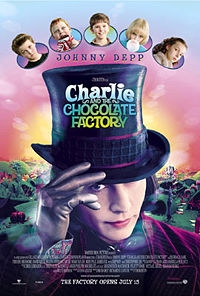
Charlie and the Chocolate Factory is a 2005 film directed by Tim Burton and starring Johnny Depp. Based on the 1964 Roald Dahl children's novel of the same name, the film also stars Freddie Highmore as Charlie Bucket and is the second film adaptation of the book. It is also the second film based on a Roald Dahl novel worked on by Tim Burton. It became a box office success and received positive critical reaction, receiving an Academy Award nomination at the 78th Academy Awards for Best Costume Design. The film was released in North America on July 15, 2005 by Warner Bros. Pictures and Village Roadshow Pictures.
Pans Labyrinth

Pan's Labyrinth (Spanish: El laberinto del fauno, literally The Labyrinth of the Faun) is a 2006 Spanish language fantasy film written and directed by Mexican film-maker Guillermo del Toro. It was produced and distributed by the Mexican film company Esperanto Films.
Pan's Labyrinth takes place in Spain in May and June, 1944, after the Spanish Civil War, during the franquist repression. Also present is the main character Ofelia's fantasy world which centers around an overgrown abandoned labyrinth. Ofelia's stepfather, the Falangist Captain Vidal, viciously hunts the Spanish Maquis, guerrillas who fight against the Franco regime in the region, while Ofelia's pregnant mother grows increasingly ill. Ofelia meets several strange and magical creatures who become central to her story, leading her through the trials of the old labyrinth garden. The film employs make-up, puppetry, and CGI effects to create its creatures.
Del Toro stated that he considers the story to be a parable, influenced by fairy tales, and that it addresses and continues themes related to his earlier film The Devil's Backbone, a spiritual sequel, though not an actual sequel. The original Spanish title refers to the mythological fauns of Greek mythology, while the English title refers specifically to the faun-like Greek character Pan (intended to help English-speakers differentiate the title from the term fawn). However, del Toro has stated that the faun in the film is not Pan.
Pan's Labyrinth takes place in Spain in May and June, 1944, after the Spanish Civil War, during the franquist repression. Also present is the main character Ofelia's fantasy world which centers around an overgrown abandoned labyrinth. Ofelia's stepfather, the Falangist Captain Vidal, viciously hunts the Spanish Maquis, guerrillas who fight against the Franco regime in the region, while Ofelia's pregnant mother grows increasingly ill. Ofelia meets several strange and magical creatures who become central to her story, leading her through the trials of the old labyrinth garden. The film employs make-up, puppetry, and CGI effects to create its creatures.
Del Toro stated that he considers the story to be a parable, influenced by fairy tales, and that it addresses and continues themes related to his earlier film The Devil's Backbone, a spiritual sequel, though not an actual sequel. The original Spanish title refers to the mythological fauns of Greek mythology, while the English title refers specifically to the faun-like Greek character Pan (intended to help English-speakers differentiate the title from the term fawn). However, del Toro has stated that the faun in the film is not Pan.
The Hours

The Hours is a 2002 film about three women of different generations and times whose lives are interconnected by Virginia Woolf's novel, Mrs Dalloway. The film is starring Nicole Kidman, Julianne Moore, Meryl Streep and Ed Harris.
The Phantom of the Opera

The Phantom of the Opera is a 2004 film adaptation of Andrew Lloyd Webber and Charles Hart's 1986 stage musical, which is based on the novel of the same name by Gaston Leroux. The film was written and directed by Joel Schumacher and Webber and Webber produced the film. The cast includes Gerard Butler as the Phantom, Emmy Rossum (who was only 17 at the time of filming) as Christine Daaé, Patrick Wilson as Raoul, Vicomte de Chagny, Miranda Richardson as Madame Giry, Jennifer Ellison as Meg Giry, and Minnie Driver (whose vocals were dubbed by Margaret Preece, a professional opera singer) as Carlotta Giudicelli. Ramin Karimloo (who had been playing Raoul in the London production of Phantom at the time of filming) appeared in a cameo role as Christine's father.
The film was a USA/UK co-production that had various distributors worldwide. For example, Warner Bros. (a main production partner) distributed the film in the USA, and Universal Pictures (producers and/or distributors of the 1925, 1943, and 1962 adaptations of the book) released the film in Latin America and Australia.
The film was a USA/UK co-production that had various distributors worldwide. For example, Warner Bros. (a main production partner) distributed the film in the USA, and Universal Pictures (producers and/or distributors of the 1925, 1943, and 1962 adaptations of the book) released the film in Latin America and Australia.
Annie

Annie is a 1982 musical film based upon the popular 1977 stage musical of the same name, with music by Charles Strouse, lyrics by Martin Charnin, and the book by Thomas Meehan. It was released in 1982 by Columbia Pictures.
The film version was directed by John Huston, and starred Carol Burnett and Albert Finney. This was Huston's first and only film musical.
The film version was directed by John Huston, and starred Carol Burnett and Albert Finney. This was Huston's first and only film musical.
The Piano

The Piano is a 1993 film about a mute pianist and her daughter, set during the mid-19th century in a rainy, muddy frontier New Zealand backwater. The film was written and directed by Jane Campion, and stars Holly Hunter, Harvey Keitel, Sam Neill and Anna Paquin. It features a score for the piano by Michael Nyman that became a bestselling soundtrack album. Hunter played her own piano pieces for the film, and also served as sign language teacher for Paquin, earning herself three different screen credits. The film was an international co-production by Australian producer Jan Chapman with the French company Ciby 2000.
Alistair Fox has argued that The Piano was significantly influenced by Jane Mander's The Story of a New Zealand River.
Alistair Fox has argued that The Piano was significantly influenced by Jane Mander's The Story of a New Zealand River.
Hannah Montana
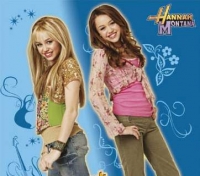
Hannah Montana is an Emmy Award-nominated American television series, which debuted on March 24, 2006 on Disney Channel. The series focuses on a girl who lives a double life as an average teenage school girl named Miley Stewart (played by Miley Cyrus) by day and a famous pop singer named Hannah Montana by night, concealing her real identity from the public, other than her close friends and family.
On April 9, 2008, it was announced that Hannah Montana would return for a third season in 2008 and production started on August 4, 2008.
On April 9, 2008, it was announced that Hannah Montana would return for a third season in 2008 and production started on August 4, 2008.
The English Patient
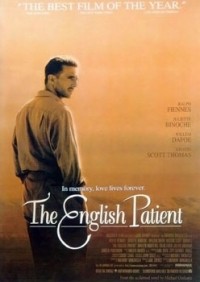
The English Patient is a 1996 film adaptation of the novel by the same name by Michael Ondaatje starring Ralph Fiennes, Kristin Scott Thomas, Willem Dafoe, Juliette Binoche (who won the Academy Award for Best Supporting Actress for her role as "Hana" in this film) and Colin Firth. The film, directed by Anthony Minghella, won nine Academy Awards, including Best Picture. Ondaatje worked closely with the filmmakers to preserve his artistic vision, and stated that he was happy with the film as an adaptation.
Top Gun

Top Gun is a 1986 American film directed by Tony Scott and produced by Don Simpson and Jerry Bruckheimer in association with Paramount Pictures. The screenplay was written by Jim Cash and Jack Epps Jr., and was inspired by an article written by Ehud Yonay for California Magazine entitled "Top Guns." The film stars Tom Cruise, Kelly McGillis, Anthony Edwards, Val Kilmer and Tom Skerritt.
The film follows LT Pete "Maverick" Mitchell, a young Naval aviator who aspires to be a top fighter pilot in the United States Navy Fighter Weapons School, which trains the top 1% of all Naval aviators. Maverick gets his chance to attend the school after one pilot drops out, allowing him and his RIO (Radar Intercept Officer, the "back seater" in the two-man F-14) LTJG Nick "Goose" Bradshaw to train with the best. The film opened in America on May 16, 1986 to good reviews, the aerial scenes being most notably praised. Similar praise followed soon afterwards when the film broke records at the box office, becoming a mega hit. The film accumulated over $350 million world-wide, and broke home-video sales records.
The film follows LT Pete "Maverick" Mitchell, a young Naval aviator who aspires to be a top fighter pilot in the United States Navy Fighter Weapons School, which trains the top 1% of all Naval aviators. Maverick gets his chance to attend the school after one pilot drops out, allowing him and his RIO (Radar Intercept Officer, the "back seater" in the two-man F-14) LTJG Nick "Goose" Bradshaw to train with the best. The film opened in America on May 16, 1986 to good reviews, the aerial scenes being most notably praised. Similar praise followed soon afterwards when the film broke records at the box office, becoming a mega hit. The film accumulated over $350 million world-wide, and broke home-video sales records.
The Addams Family

The Addams Family is a 1991 black comedy film based on the characters, from the cartoon of the same name, created by cartoonist Charles Addams, featuring songs and a video from rap artist MC Hammer ("Addams Groove").
The movie was originally developed by Orion Pictures (which at the time owned the rights to the television series on which the movie was based). However, due to the studio's financial problems, Paramount Pictures began co-producing the film and ended up releasing the movie in the U.S., with Orion retaining the international rights (these rights are now owned by Metro-Goldwyn-Mayer through their 1997 purchase of Orion). The 1993 sequel, Addams Family Values, was distributed worldwide by Paramount.
The Addamses are a family of wealthy and eccentric individuals who live together in a Second Empire mansion and share a common interest in the bizarre and the macabre. The characters first appeared in cartoons in The New Yorker magazine in the 1930s, and later gained popularity in the defunct TV series, The Addams Family. The film centers on the day to day life of the family, and the return of Gomez Addams's long-lost brother Fester, played by Christopher Lloyd. The film also stars Raúl Juliá, Anjelica Huston, and Christina Ricci.
The movie was originally developed by Orion Pictures (which at the time owned the rights to the television series on which the movie was based). However, due to the studio's financial problems, Paramount Pictures began co-producing the film and ended up releasing the movie in the U.S., with Orion retaining the international rights (these rights are now owned by Metro-Goldwyn-Mayer through their 1997 purchase of Orion). The 1993 sequel, Addams Family Values, was distributed worldwide by Paramount.
The Addamses are a family of wealthy and eccentric individuals who live together in a Second Empire mansion and share a common interest in the bizarre and the macabre. The characters first appeared in cartoons in The New Yorker magazine in the 1930s, and later gained popularity in the defunct TV series, The Addams Family. The film centers on the day to day life of the family, and the return of Gomez Addams's long-lost brother Fester, played by Christopher Lloyd. The film also stars Raúl Juliá, Anjelica Huston, and Christina Ricci.
Love Story
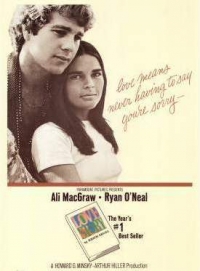
Love Story is a 1970 romantic drama film written by Erich Segal coordinated with his 1970 best-selling novel. It was directed by Arthur Hiller. The film, well-known as a tear-jerking tragedy, is considered one of the most romantic of all time by the American Film Institute (#9 on the list), and was followed by a sequel, Oliver's Story in 1978. Love Story starred Ali MacGraw and Ryan O'Neal and also marked the film debut of a then-unknown Tommy Lee Jones, who played a minor role in the film.
The Fountain

The Fountain is a 2006 American science fiction/fantasy film directed by Darren Aronofsky that follows three interwoven narratives that take place in the age of conquistadors, the modern-day period, and the far future. The film stars Hugh Jackman and Rachel Weisz, whose characters' romance exists in all three time periods. The Fountain explores the themes of love and mortality, drawing influences from the The Fountain of Youth and The Tree of Life. The film is framed with visual language by using transition scenes, light, and shapes.
Originally to be filmed in 2002 on a budget of $70 million with Brad Pitt and Cate Blanchett in the lead, The Fountain shut down production as a result of Pitt's departure. Aronofsky was able to resurrect the project in 2005 with half the budget. The director incorporated visual effects into The Fountain by using minimal computer-generated imagery; he reduced the use of computers by using inexpensive footage provided by a macro-photographer. The Fountain was commercially released in the United States on November 22, 2006, to divided reviews.
Originally to be filmed in 2002 on a budget of $70 million with Brad Pitt and Cate Blanchett in the lead, The Fountain shut down production as a result of Pitt's departure. Aronofsky was able to resurrect the project in 2005 with half the budget. The director incorporated visual effects into The Fountain by using minimal computer-generated imagery; he reduced the use of computers by using inexpensive footage provided by a macro-photographer. The Fountain was commercially released in the United States on November 22, 2006, to divided reviews.
Becoming Jane

Becoming Jane is a 2007 historical film directed by Julian Jarrold. It is inspired by the early life of author Jane Austen (portrayed by Anne Hathaway), and her posited relationship with Thomas Langlois Lefroy (played by BAFTA-winning Scottish actor James McAvoy). Julie Walters, James Cromwell and Maggie Smith also appear in this picture. The film was produced in cooperation with several companies, including BBC Films and the Irish Film Board. The film performed well at the box office, earning $37 million worldwide according to Box Office Mojo.
The casting was by Gail Stevens and Gillian Reynolds, costumes by Eimer Ni Mhaoldomhnaigh, and original soundtrack composed by Adrian Johnston. Although the film assumes an otherwise unproven relationship between Austen and Lefroy, the original screenplay was inspired by real events, which were chronicled in the book Becoming Jane Austen by Jon Spence, who was the historical consultant on the film. In fact, prior to Spence’s book, biographers Radovici (1995) and Tomalin (2000) have also acknowledged a relationship between Jane Austen and Tom Lefroy. Tomalin’s book was referenced in the making of Becoming Jane.
The casting was by Gail Stevens and Gillian Reynolds, costumes by Eimer Ni Mhaoldomhnaigh, and original soundtrack composed by Adrian Johnston. Although the film assumes an otherwise unproven relationship between Austen and Lefroy, the original screenplay was inspired by real events, which were chronicled in the book Becoming Jane Austen by Jon Spence, who was the historical consultant on the film. In fact, prior to Spence’s book, biographers Radovici (1995) and Tomalin (2000) have also acknowledged a relationship between Jane Austen and Tom Lefroy. Tomalin’s book was referenced in the making of Becoming Jane.
 Sheet Music Drive is a web site for those who wants to access popular sheet music easily,
letting them download the sheet music for free for trial purposes.
It's completely free to download and try the listed sheet music, but you have to delete the files after 24 hours of trial period.
Don't forget, if you like the piece of music you have just learned playing,
treat the artist with respect, and go buy the original sheet music.
Sheet Music Drive is a web site for those who wants to access popular sheet music easily,
letting them download the sheet music for free for trial purposes.
It's completely free to download and try the listed sheet music, but you have to delete the files after 24 hours of trial period.
Don't forget, if you like the piece of music you have just learned playing,
treat the artist with respect, and go buy the original sheet music.